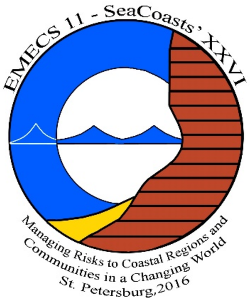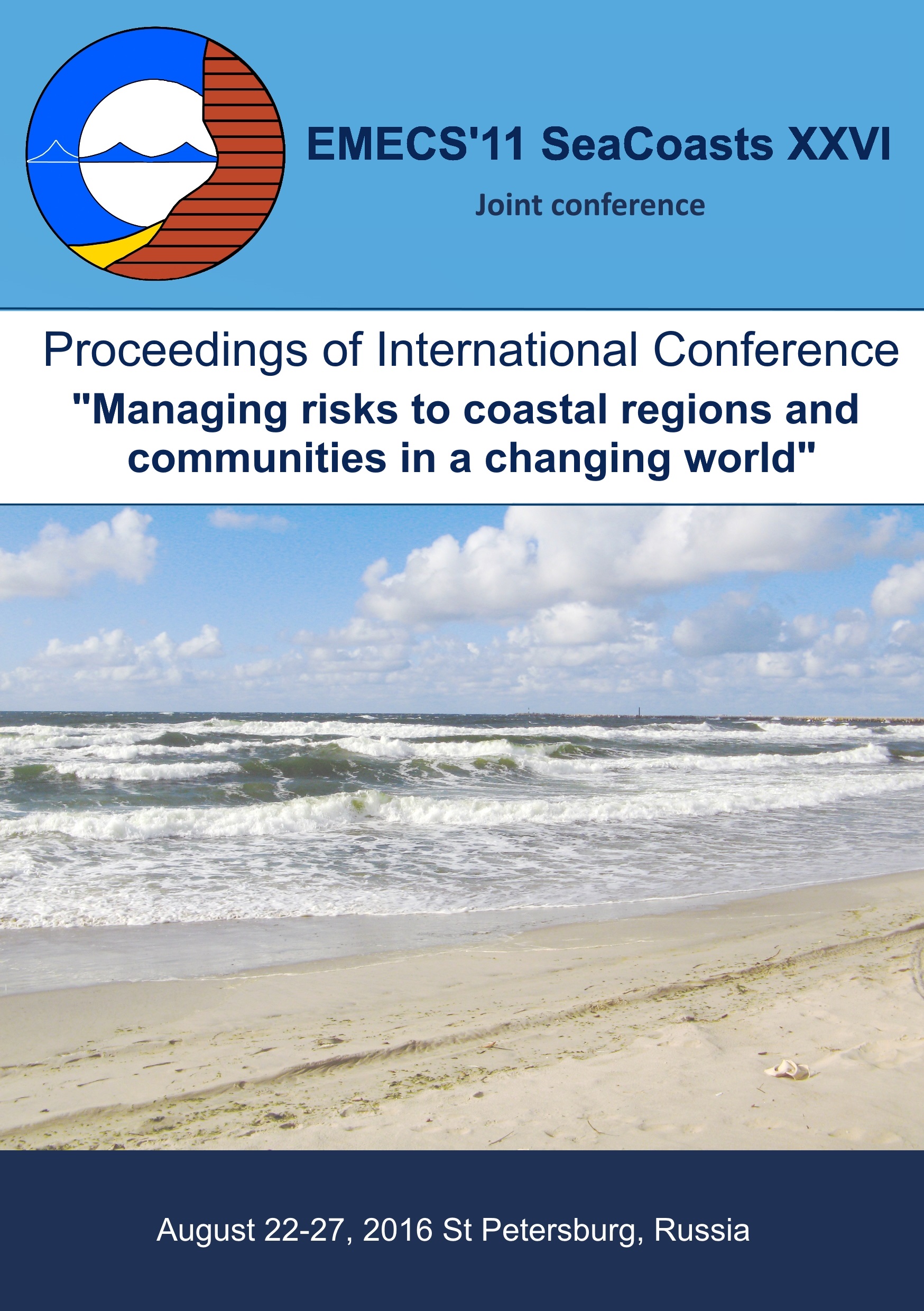BISAC NAT010000 Ecology
BISAC NAT045050 Ecosystems & Habitats / Coastal Regions & Shorelines
BISAC NAT025000 Ecosystems & Habitats / Oceans & Seas
BISAC NAT045030 Ecosystems & Habitats / Polar Regions
BISAC SCI081000 Earth Sciences / Hydrology
BISAC SCI092000 Global Warming & Climate Change
BISAC SCI020000 Life Sciences / Ecology
BISAC SCI039000 Life Sciences / Marine Biology
BISAC SOC053000 Regional Studies
BISAC TEC060000 Marine & Naval
The article deals with current trends of development of tourism on the Black Sea coast, related to geographical, economic, geopolitical factors.
Black Sea coast, tourism and recreation complex, tourism, current trends.
- Introduction
Black Sea coast has a number of natural features that define the high tourism and recreation potential of the territory. The unique combination of different resources defines the high tourism and recreation potential of the territory and creates conditions for the development of various forms of tourist activity.
In view of the existing tourism industry (accommodation facilities, entertainment companies, etc.) and infrastructure we can talk about conditions for the development of almost all types of tourism:
- cultural, educational and historical
- health and resort
- children
- ecological
- business
- ethnographic
- religious
- agritourism (rural)
- gastronomic and wine
- active forms of tourism (diving, kitesurfing, hang-gliding, biking, caving, jeeping, rafting, horse riding, skiing and snowboarding, mountain climbing).
- Tourism development factors
In general, current trends in the development of tourism on the Black Sea coast are determined by several factors:
- The presence of significant historical and cultural potential and the unique culture of the local communities. According to archaeological evidence, the Caucasus is really to be considered one of the main points related to the "Cradle places of human civilization" (a series of sites of ancient human settlements in the Caucasus extends back over 300-350 thousand years).
- National tourism policy.
- Mass sports and other events (in the Krasnodar region).
- The new geopolitical conditions and geo-economics in Russia and in the world.
- Other factors.
- Current tourism trends
The current trends in the development of tourism on the Black Sea coast are:
- Development of new areas for tourism and development of existing tourism and recreation systems.
- Integration processes in the management of tourism: creation of tourist and recreation clusters headed by management companies, establishment of a unified tourist brand.
- State’s enhanced role and participation in tourism development.
- Involving the local tourist market in the globalization process.
- Activation of event tourism to ensure the occupancy of the Olympic infrastructure.
- Transformation of the hotel services market as a result of the XXII Olympic and XI Paralympic Winter Games.
- Safety and security control intensification.
- Tourism market changes according to new geopolitical and geo-economic conditions in Russia and in the world.
Development of new areas for tourism purposes and development of existing tourism and recreation systems and Integration processes in the management of tourism: creation of tourist and recreation clusters headed by management companies, establishment of a unified tourist brand
These trends are directly related to the development and implementation of a large number of investment projects in the tourist-recreation complex.
The tourist and recreation potential of the Black Sea coast should always be explored and managed. Present-day national tourism policy includes an important part which deals with investments. Investment policy plays a significant role in the creation of favorable conditions facilitating investment activity in tourism. Tourist and recreation complex is characterized by high investment attractiveness (prospects).
Significant investments are secured due to the implementation of major reconstruction projects and construction of sports facilities, as well as collective accommodation facilities in the resort city of Sochi under the Federal Program “Development of Sochi as a mountain and climatic health resort”.
Strategic investment projects and the federal program are implemented in the southern regions of Russia. It ensures increasing stability of the economy, increases the interest of potential investors in the region. A powerful impetus for investment was the project Sochi-2014, high-speed circuit Formula 1, mountain climatic resort “Lagonaki”, gambling zone “Azov-City”, infrastructural projects – Novorossiysk transport hub, construction of the port Taman . A project to create a tourism cluster and to prepare for the 2018 FIFA World Cup is now in progress.
Each of the investment projects represents a sort of a center around which all the business will be developing later – from large corporations to small businesses. They will bring innovation to the region and launch high-tech industries. Without this it is impossible to develop the economy in today's market and strong competition – such projects promote the regions. They really change the future and can become powerful points of growth for decades to come.
Of the southern regions only in the Krasnodar region they have worked out rather effective instruments of state incentives (privileges and preferences): benefits for tax payments to the regional budget, provision of government guarantees on a competitive basis, the investment tax credit on income tax, maintenance projects. A new edition of the Law concerning “State promotion of investment activity in the Krasnodar Region” has been approved. It establishes the right of an investor to claim several forms of state support.
The North Caucasus Federal District subjects of the Russian Federation run a State program “Development of the North Caucasus Federal District until 2025” and the federal target program “South of Russia” (2014-2020.). In the republics of the North Caucasus Federal District, Krasnodar Region and the Republic of Adygea there have been created special economic zones of a tourist-recreational type that make up the North Caucasus tourism cluster.
Tourism industry in Krasnodar region is headed by the Ministry of Resorts, Tourism and Olympic heritage that includes investment department. Investment Legislation in Krasnodar region is one of the best in the country; the region offers investors real and big benefits and preferences, financial and non-financial measures of state support for projects, introducing advanced international experience of other countries and regions.
To maintain the economic growth after the Olympics, they must actively use the mechanisms of public and private partnership.
Project vision of tourist clusters is as follows:
- providing a significant contribution to the regional economy through the provision of competitive and high-quality tourist services at the international level;
- creating conditions favorable for attracting private investment, business development and significant growth of employment in the region.
The management company provides conditions for the development of modern tourist complexes of the international level in the open economic zone through the following measures:
- implementation of long-term plans based on the best world practices;
- implementation of the methods of public and private partnerships;
- creation of a modern infrastructure and its operation system;
- complex promotion of the North Caucasus tourism cluster.
Increased role and participation of the state in the process of tourism development
Nowadays state programs of tourism development work in Krasnodar region; they include funding for a variety of purposes.
State programs of tourism development:
- Federal Target Program “South of Russia” (2014-2020)
- State Program of the Krasnodar Region “Development of the health resort and tourist complex” (2014-2017)”
- Municipal program “Development of the health resort and tourist complex in Sochi (2014-2018)”
- The concept of Sochi sustainable development till 2030
- Tourism cluster project supervised by “Resorts of the North Caucasus”
- Others.
The government policy objectives and state programs for tourism development are as follows:
- increase of tourist arrivals;
- development of the accommodation facilities (increase in the number of rooms and hotels);
- increase of paid services in the tourism industry;
- economic effects (creation of additional jobs in the tourism service sector and related industries).
Involving local tourist market in the process of globalization
As we know, globalization in the hospitality industry is manifested in the presence of international operators on the market, especially hotel operators. In this matter, the Krasnodar region is the undisputed leader among all subjects in the whole of the North Caucasus and even the Russian Federation.
The Krasnodar region is actively developing its domestic tourism. For several reasons western management companies did not consider the Azov and the Black Sea coasts as a promising area, but analysis shows that the resorts of the Krasnodar region have moved to a new level due to the Olympic Games in Sochi. Now the Krasnodar region has become more interesting for investors who invest in the hotel business.
Every year, about 1.5 million tourists visit the city of Krasnodar – the regional capital. Moreover, this figure is constantly growing. The hotel Hilton Garden Inn Krasnodar was the first international hotel brand in the regional center. In January 2016, Ibis Krasnodar Centre opened the doors for Krasnodar guests. The appearance of international operators in the city is one of the indicators of its dynamic development. In addition, in 2016 the regional center plans to open another hotel with a great international name Four Points by Sheraton run by the hotel operator Starwood Hotels & Resorts Worldwide. Other hotel brands are going to start their work in Krasnodar (Krasnodar Marriott Hotel; Azimut Hotel).
Interest of international hotel operators to the south of Russia appeared in 2005. However, during the crisis of 2008-2009 many developers have abandoned their projects. Right now, especially in the light of the dynamic development of the region, there has come quite a good time for the resumption and implementation of once deferred plans. The most active in this area are such large international hotel operators as Rezidor Hotel Group, Hilton Hotels, Marriott Hotels & Resort, Intercontinental, Kempinski, Holiday Inn Hotels & Resorts, Accor and others.
Sochi was and still is the most popular among the international hotel operators in the Black Sea resort market. Hotel operators and brands in Sochi are the following:
- Rezidor SAS (Radisson SAS, Park Inn)
- Golden Tulip Hotels, Suites & resorts
- Mercure Hotels
- Swissotel Hotels & Resorts
- Hyatt Hotels & Resorts
- Solis Hotels & Resorts
- Marriott Hotels & Resorts.
Sochi is one of the three city leaders in Russia in terms of the presence of international hotel operators (Fig.1, 2). Sochi is the most developed city in the country in terms of hotel infrastructure after Moscow and St. Petersburg, and its leading position is explained by the recent Olympic Games held in the city, which created great demand for international standard hotels. Somewhat surprisingly, Sochi’s development continued after the Olympics – five more hotels, operated by Starwood Hotels, Marriott International Inc., Hilton Worldwide, Accor Hotels and Rezidor Hotel Group, are expected to add to the network of 20 existing branded properties in Sochi.
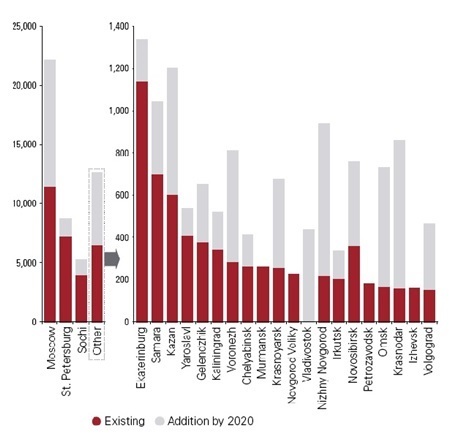
Fig. 1. Distribution of branded room stock in Russia by cities
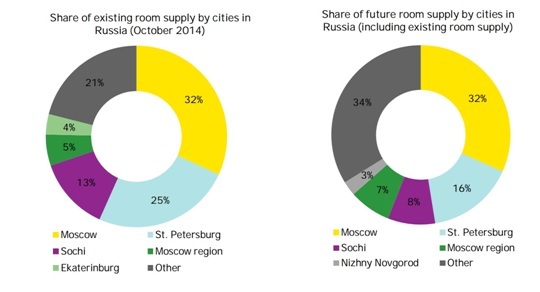
Fig. 2. Share of existing and future room supply by cities
Activation of event tourism to ensure the occupancy of the Olympic infrastructure
The new infrastructure that was built in Sochi for the Games requires a continuing effort to ensure its workload. In this regard, today Sochi becomes the third largest city in Russia, tourist and sports center. In the fall of 2014 Sochi hosted Formula 1 competition, and in 2018 the stadium “Fischt” will be welcoming the guests of the World Cup.
These are global sporting events, of course, which, however, cannot provide the demand for the facilities throughout the year.
Therefore, after the Games, there have been held many social events in Sochi.
In the firstplace, the President of Russia Mr. Putin began to spend more time in Sochi – it led to the construction of the residence “Bocharov Stream” and on 2nd June 2014 a new residence “Bocharov Stream-2” for journalists was opened to hold international meetings and negotiations. Now Sochi is seen not only as a resort, but also as an important administrative unit.
Mr. Gref (the head of “Sberbank”) made a proposal to oblige state-owned companies to hold annual meeting in Sochi. These actions may also increase the occupancy of the resort.
The way which is now being actively implemented, – Sochi is the sport capital. The climate and topography of the region provides simultaneous operation of the mountain and coastal clusters, thus Sochi will be a unique training ground for athletes.
In addition, a large number of mass public events (festivals, forums, exhibitions, conferences, meetings, and even school subject contests) are now held in Sochi, because the city has a developed infrastructure and allows to accommodate a large number of guests at the meeting venue.
In order to attract more visitors to Sochi after the Games there have been built amusement parks: Sochi Park, Sky Park.
Today, Sochi is a city that offers many options, gives many ways to spend time. Modern Sochi is a unique resort of active recreation.
Transformation of hotel services market as a result of the XXII Olympic and XI Paralympic Winter Games
During the preparation for the Games in Sochi many new accommodation facilities were built, the total number of rooms increased too (Fig. 3).
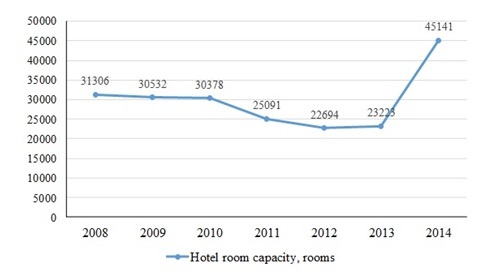
Fig. 3. Dynamics of changes in the Hotel room capacity in Sochi
In addition to the general increase in the number of hotels and rooms, Sochi has sharp increase in the number of classified (certified) accommodation facilities. The national system which determines the classification of hotels and other accommodation facilities is optional in Russia. However, one of the requirements of the International Olympic Committee is the certification of all accommodation facilities, which take in the participants and guests of the Games, according to the national classification system. Unsurprisingly, the largest number of classified accommodation facilities in the country operates in Sochi now (77%), and among the areas of the Krasnodar region – 70% (Fig.4).
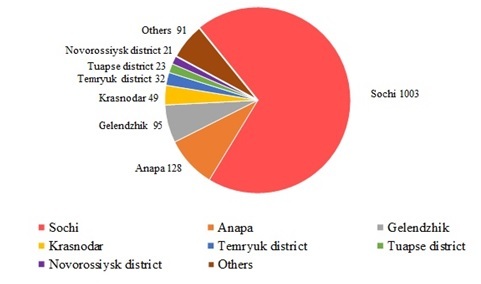
Fig. 4. Number of classified accommodation facilities in Krasnodar region
Studying the geography of classified accommodation facilities in Sochi, we can see that the maximum number of them is located in Adler (1st place) and Central districts (Fig. 5). This is due to the Games in the mountain and coastal clusters. In addition, these two areas are characterized by convenient transport availability and accessibility of railway stations and Sochi airport.
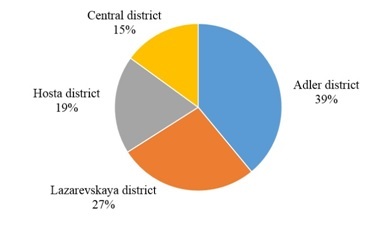
Fig. 5. The distribution of classified accommodation facilities in Sochi districts
The national system assigns six categories of accommodation facilities - from 1 to 5 stars, and the category "no stars". Categorizing accommodation facilities in 2014 is shown in Figure 6.
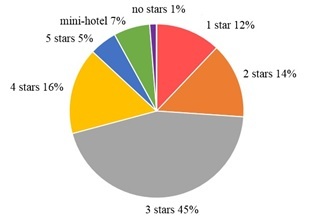
Fig. 6. Share of rooms in classified accommodation facilities of different categories in Sochi
Mandatory hotel classification system is a legacy of Sochi and ensures civilized competition on domestic and international tourism markets.
Safety and security control
In terms of improving the safety of tourists staying on the territory of the tourist centers of the Black Sea coasts the following measures are implemented:
- large-scale development of modern systems of prevention of emergency situations;
- staff increase and equipment of emergency rescue services
- improving the monitoring network of hazardous natural processes and phenomena
- special police forces functioning as tourist police.
Tourism market changes according to the new geopolitical and geo-economic conditions in Russia and in the world
In 2014 Crimea was integrated into the Russian Federation. The Republic of Crimea has rich tourist and recreational potential, and the integration will certainly affect the transformation of the tourist market in the south of Russia. This fact now makes many organizations of the tourism industry work harder. Meanwhile there are some geographical difficulties impeding the travel of Russian tourists to Crimea. But as soon as the bridge across the Kerch Strait is built (within the next 2-3 years), the flow of tourists will be greatly redistributed, and resorts of the Krasnodar region can experience reduced demand for their tourist services.
According to the approved blueprints, the Bridge across the Kerch Strait will consist of a road (4 lanes, maximum speed of 120 km/h, capacity – up to 40,000 cars per day) parallel to rail sections (2 railway lines, maximum speed – 160 km/h). The bridge starts on the Taman peninsular, runs along Tuzla Island, crosses the Kerch Strait, going around Cape Ak-Burun in the north. The crossing will be 19 km long.
In the meantime, the tourism market situation in the Krasnodar region has not changed very mIVuch. Moreover under Western sanctions the resorts of the Krasnodar region took more tourists than planned. In particular, the demand for beach holidays in the Krasnodar region, as estimated by experts, has increased by 30%.
- Conclusion
The Western Caucasus is a unique region, which combines a variety of recreational resources and which has great potential for tourism development. Factors affecting the development of tourism in the region and the tourism trends must be thoroughly investigated. The findings of these studies should be the basis for the tourism policy of the Russian Federation and be used by enterprises and organizations of the tourism market in their work (economics, marketing, planning).
Supported by the grant from the Russian Science Foundation and the Administration of Krasnodar region № 16-12-23006 а(р)
1. International hotel chains in Russia - 2015. EY review. http://www.ey.com.
2. International hotel operators in Russia and the CIS. KMPG overview 2015. http://www.kpmg.com.
3. Maksimov D.V., Minenkova V.V., Volkova T.A., Karpova J.I., Kudelya E.V. Individual means of accommodation on the resorts of Krasnodar region. Asian Social Science: scientific Journal. - Vol. 11. - №. 3. Canada: Canadian Center of Science and Education, 2014: s. 335-343. http://dx.doi.org/10.5539/ass.v11n3p335.
4. Maksimov D.V., Minenkova V.V. The gambling zone “Azov-City”: priorities for selecting a location. Proceedings of the III International scientific-practical conference “Resort and recreational complex in the system of regional development: innovative approaches”. Krasnodar, April 2015, p. 76-80.
